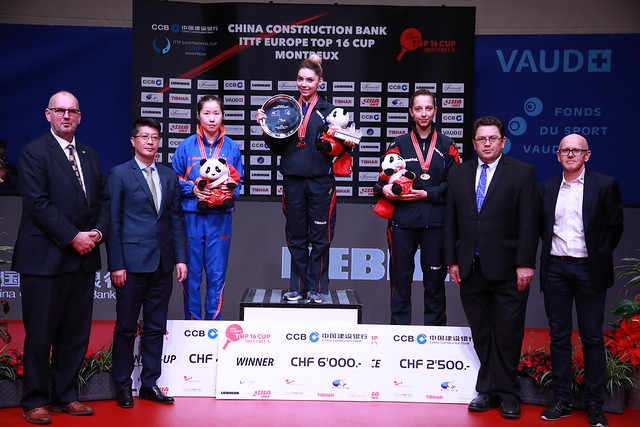by Ian Marshall, ITTF Publications Editor
Impressively, in the 47 year history of the tournament, which started life in 1971 in Zadar as the Europe Top 12, including both the men’s and women’s events, Sweden heads the medal table. However, Germany is in close pursuit. It is so close that when play concludes in the Swiss city, the roles could well be reversed.
Furthermore, the impetus is with Germany.
Overall Sweden has won 45 medals (16 gold, 15 silver and 14 bronze), Germany has 43 medals with notably titles won, being exactly the same (16 gold, 12 silver, 15 bronze). The two countries are well ahead of the field; next in line is Hungary, the sum being 27 (13 gold, 7 silver, 7 bronze).
However, a great deal of water has passed under the bridge since Sweden last secured a medal at the tournament; in fact it is 20 years ago. In 1998 on home soil in Halmstad in the men’s event Peter Karlsson finished in runners up spot, Jan-Ove Waldner departed at the semi-final stage. Somewhat similarly in the women’s competition, Marie Svensson concluded in the bronze medal position.
In a golden era, starting with Stellan Bengtsson who won in 1973 in Böblingen and was to win again in 1980 in Munich, Sweden was the dominant force in the men’s event. Kjell Johansson, Jörgen Persson and Erik Lindh each won on one occasion, Mikael Appelgren succeeded twice, whilst to this day, with seven wins, Jan-Ove Waldner stands alone. Furthermore, Ann-Christin Hellman won the women’s title in 1975 in Vienna and 1976 in Lübeck.
Meanwhile, up to and including 1998 (before 1990, representing Federal Germany prior to unification) German women had enjoyed success. Olga Nemes had one gold, two silver and two bronze medals to her credit; Jie Schöpp had one gold and one bronze; Nicole Struse owned one silver and three bronze medals. Additionally in 1975 in Vienna, Wiebke Hendriksen had been the silver medallist.
Most creditable but for the men it was somewhat different, in the tournaments staged prior to 1998 and in fact in the whole of the 20th century, only one German male name gained a podium finished; Jörg Rosskopf was the runner up in1992 in Vienna and the following year semi-finalist in Copenhagen.
Conversely, in the current century, it has been the age of Germany. In the men’s event, following the bronze medal secured by Jörg Rosskopf in 2000 in Alassio; commencing in 2002 in Rotterdam, Timo Boll has won on five occasions, Dimitrij Ovtcharov four times. Equally, for the women, in the present century, Qianhong Gotsch has won twice, Jie Schöpp, Nicole Struse and Wu Jiaduo, once each.
Now in 2018, Germany is present in force, the full complement of four players in the Men’s Singles event in the guise of Dimitrij Ovtcharov, Timo Boll, Ruwen Filus and Bastian Steger; for the women it is Petrissa Solja and Sabine Winter.
How many medals can we expect from that group? Moreover, how many from the Swedish trio? Enough for Germany to assume the lead, enough from the Swedes to keep pride intact?
Very much the answer lies in Swedish hands; in the men’s event Kristian Karlsson is the no.7 seed, Mattias Karlsson the no.13 seed; in the women’s competition, Matilda Ekholm is the no.8 seed.







